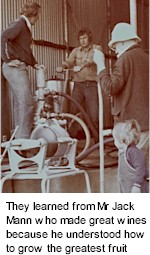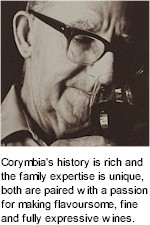


Over 100 years of experience in West Australian winemaking. Their history is rich and their expertise is unique, both are paired with a passion for flavoursome, expressive and drinkable wines. The Corymbia family tree is as strong as the vines they grow, and each generation has left their mark on the industry. One of the first on the scene, the Mann family established vineyards, created wines and shared drops along the way. They’ve learned from the past; from Mr Jack Mann who made great wines because he understood how to grow great fruit. Inspired by his innovative methods and optimism, Corymbia have taken a leaf out of the family book. A leaf which has flourished and grown into an inspiring legacy. Every vineyard that Corymbia operate feature the Marri tree. So, each wine you drink now and in the future, will be grown under the finest conditions.

A good bottle begins with a good grape. Known to winemakers and drinkers alike, the selection of suitable soils is paramount to growing desirable grapes great wine. So where to grow wine grapes? At the same place where the Marri trees and Redgums grow. Here, the soils are optimal for growing grapes. Corymbia know from generations of experience. It is under the Gums where the vine roots penetrate the depth of soil to lock in summer moisture. To ensure the health of the environment and Corymbia's vines, there needs to be a balance of flora and fauna, fungi, bacterium and yeast. These elements all interact positively and negatively. The ultimate success of their wines comes down to the positive interactions between nature's many partners.
Nature’s good at keeping busy. Late in summer, a small green bird called a silvereye, swoop on the grapes to receive their sugar fix. Corymbia employ exclusion netting to cover their vineyards, protecting the grapes by keeping the birds at bay. The harvests are preserved and your favourite glass of Corymbia is waiting for you.
The fermenting wines attract another local pest, the vinegar fly. They’re kept at bay by lively fantail birds which chirp and twitter around the Corymbia cellars, chasing down and consuming the pestilent vinegar flies. Sitting at the edge of fermenters, they stake the place out and catch any errant insect they find. They are winged heroes.

Let's take it inside, where the Corymbia cellars are kept in the best condition. This is where all the natural fermentations happen. Corymbia use the indigenous yeast grown in their organically farmed vineyards. The indigenous yeasts from the vineyard interact with the resident yeast in the winery to achieve a highly unique vinification. Ferments are conducted in small batches, so that every bottle, each glass and every drop has been personally and naturally created. Corymbia wines express the site whence they were sourced.
Grapes are all picked by hand, a highly zealous sorting of fruit is crucial. Ferments are all natural, there are no finer living yeasts than the natives of Swan Valley and Margaret River. A judicious treatment of oak ensures the fruit is allowed to speak. There's nothing that can be done in the winemaking to better what's grown in the vineyard. All the natural conditions of the land, the geology and history, husbandry, clone, climate and conversation. It’s subtle, but you can taste it. They make the best wine by growing the best fruit, uncomplicated and respectful of nature. By listening to the earth and working with the elements to make the finest harvest. That’s the nature of wine. We can all drink to that.
